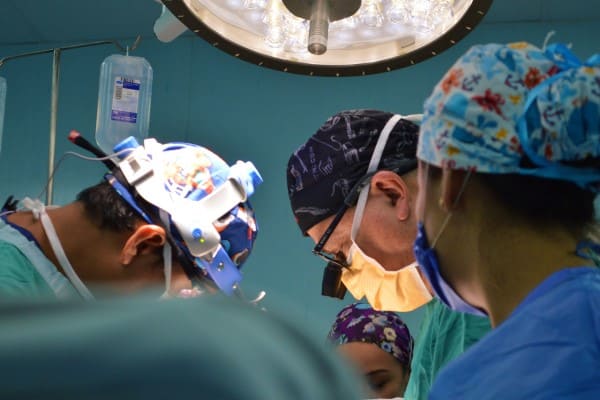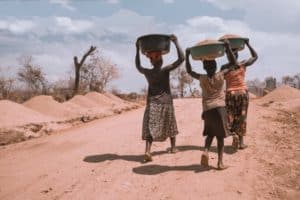This page contains affiliate links. This means if you a follow a link and make a purchase, at no additional cost to you, Humanitarian Careers will receive a commission. Thank you for supporting the site.
When conflicts, crises and disasters hit communities, people require urgent medical assistance. Humanitarian crises also destroy healthcare infrastructure limiting people’s access to quality medical care. Humanitarian organisations respond by setting up health facilities, deploying medical teams and working to increase the capacities of local health NGOs and government clinics.
If you are interested in working in humanitarian aid in a health role, we have put together this guide of the main jobs as well as some of the top NGO recruiting these positions.
Medical Doctor
Medical doctors play a key role in humanitarian responses. They work on the frontline of crises managing health facilities and providing care to people in need.
Working as a medical doctor as part of a humanitarian response means using your medical expertise to ensure people receive quality healthcare, even during times of disaster and crisis. Jobs working as medical doctors for humanitarian NGOs can also involve providing trainings to local medical teams to increase their capacity.
Doctors working as part of a humanitarian mission must often operate with limited equipment and in basic facilities. Humanitarian NGOs deploy doctors internationally, as well as recruit local doctors from affected communities to work on their projects.
If you are interested in working as a doctor as part of a humanitarian response, you will need to be fully qualified and have completed your medical training. You are also likely to need some training or experience working as a medical doctor in crisis hit areas or with communities living in poverty.
Some of the top humanitarian organisations that recruit doctors are:
- Médecins San Frontieres
- Médecins du Monde
- Save the Children
- World Health Organization
- UK-Med
- International Medical Corps
Nurse
Nurses work on the frontline of humanitarian responses providing care to affected people. Humanitarian organisations deploy nurses into key management positions to help set-up and run their health projects. They also employ nurses to train local teams and improve their capacities.
Humanitarian NGOs employ nurses with a wide range of specialisms depending on the context of their responses. Nurses are often recruited locally to work on humanitarian projects, as well as being deployed internationally.
Working as a nurse on a humanitarian response can be challenging as there is often limited supplies and equipment, and basic facilities. As well as working providing medical care, nurses on humanitarian missions often take on roles such as Medical Coordinator or Health Programme Manager.
The qualifications required to work as a nurse on a humanitarian mission include the completion of formal medical training and often some years professional experience. An understanding of how health projects are ran as part of humanitarian responses, as well as how medical care is given to people affected, will also be required.
Leading humanitarian organisations that regularly employ nurses include:
- Médecins San Frontieres
- Médecins Du Monde
- International Medical Corps
- CARE International
- Oxfam
- Relief International
Community Health Workers
Community health workers are recruited from crisis affected communities by humanitarian organisations. Their job is to provide information and awareness sessions and act as a vital link between the humanitarian organisation and the community they are aiming to assist.
The position of community health worker is one of the most important health roles in a humanitarian response. Community health workers come from the community and so know their culture and needs. They use this knowledge to provide care, refer cases and give key health information to the community.
Humanitarian health NGOs recruit community health workers locally. They must come from the community they serve, and so are not recruited internationally. Community health workers are often managed by the Health Programme Manager or the Project Officer for the health team.
If you want to work as a community health worker with a humanitarian NGO, look for medical organisations locally to you that are recruiting. Although a background in health or medicine can be an asset, being a key member of your local community is also highly sought after by health NGOs when recruiting community health workers.
Humanitarian NGOs to apply to if you want to work as community health worker include:
- Médecins du Monde
- Save the Children
- ICRC
- International Medical Corps
- Médecins San Frontieres
Humanitarian Health Online Courses
If you are looking to work in humanitarian health, a great addition to your CV is an online course. We think the Emory University course on Health in Complex Humanitarian Emergencies is one of the best. It covers the key concepts of healthcare in humanitarian settings. Follow the link to the course’s page.
We also highly recommend the University of Copenhagen’s online short course in Non-Communicable Diseases in Humanitarian Settings. It only takes around 15 hours to complete, and we think it’s ideal for those wanting to be a health worker in the aid sector. Click the link to find out more.
Another online course we recommend for those looking to work in a humanitarian health role is the Manchester University Global Health and Humanitarianism course. It’s a fantastic overview of both the theory and practice of humanitarian aid and public health. The link is to the course’s page with more information.
Medical Coordinator
The job of Medical Coordinator is the most senior position in a humanitarian organisations health team. Their role is to manage the implementation of the health programme, as well as provide technical advice to field teams. The position is also responsible for working on donor grant applications and reporting.
Medical Coordinators are often recruited internationally and deployed by health NGOs into humanitarian responses. They can be on long-term missions or do a ‘roving’ role that moves between emergency projects.
The position of Medical Coordinator has overall responsibility for the medical programme within a health NGO. They often oversee the budget and assist with managing the medical team. They work in close collaboration with the coordinators based in the field sites.
Humanitarian health NGOs that recruit Medical Coordinators require applicants to have formal medical training – either as a doctor or nurse. You will also need several years professional experience managing humanitarian health projects in order to become a Medical Coordinator.
The top humanitarian NGOs that regularly recruit Medical Coordinators include:
- Médecins du Monde
- Médecins San Frontieres
- Save the Children
- Relief International
- International Medical Corps
Health Programme Manager
The role of Health Programme Manager is another senior position within a health NGO. The Health Programme Manager directly overseas the running of the health projects within a humanitarian response. They manage the project team and budget and are responsible for ensuring the projects outcome.
The Health Programme Manager within a humanitarian health organisation must work closely with the field teams and medical advisors to ensure the quality of healthcare provided to beneficiaries. They are ultimately responsible for ensuring the successful completion of the project in-line with the donor grant proposal.
A key part of the job of the Health Programme Manager is to secure additional funding for the health project. This includes writing donor proposals, as well as hosting donor visits and liaising with funders
As a senior management role within a humanitarian health NGO, applicants to Health Programme Manager jobs require several years of professional experience. This is likely to combine working in a medical role – such as a Doctor, Nurse, or Pharmacist, and working in management roles as part of humanitarian responses.
Top humanitarian medical NGOs that recruit Health Programme Managers include:
- Relief International
- Save the Children
- SightSavers
- Orbis
- Malaria Consortium
MHPSS Advisor
Mental health is being seen as a crucial part of humanitarian health work. People affected by crises, conflicts and disasters can face a wide range of mental health issues. Mental health and psycho-social support (MHPSS) is now being included in most humanitarian responses by medical NGOs.
The job of MHPSS Advisor is a senior position within the mental health team of a humanitarian organisation. Their role is to provide technical advice to the MHPSS team and ensure the quality of mental health programming across the response.
The MHPSS Advisor does not directly manage the MHPSS programme. Their role is to provide technical support, including developing tools, processes and systems as well as address any issues in the projects that arise. The MHPSS Advisor also feeds into grant proposals and donor reports.
If you are applying to the job of MHPSS Advisor with a humanitarian NGO, you are likely to need to be formally qualified as a psychologist. You will also need some years professional experience, including working on mental health projects within humanitarian responses.
Humanitarian health NGOs that recruit MHPSS Advisors include:
- Médecins du Monde
- Action Contra la Faim
- International Medical Corps
- ICRC
- International Organization of Migration
Councilor
Councillors work on the frontline of humanitarian responses as part of the MHPSS project. They provide psycho-social support to people in need. They can also manage cases and refer people in need of more extensive mental health support to dedicated facilities.
As part of the mental health projects ran by medical NGOs, Councillors are one of the key health jobs. They are often based within health facilities and are recruited from the affected communities. An important part of the job of Councillors within a humanitarian response is running awareness sessions promoting MHPSS services and providing updates on the NGOs programmes to the community.
As well as Councillors, humanitarian health organisations often recruit Social Workers as part of their MHPSS teams.
If you want to work as a Councillor for a humanitarian NGO, you need to be fully qualified. You will also need to come from the community the organisation is working in. Humanitarian organisations do not deploy people into Councillor roles internationally.
Many NGOs running humanitarian MHPSS projects recruit Councillors. These include:
- Première Urgence International
- Médecins du Monde
- Action Contre la Faim
- Save the Children
MHPSS Officer
The position of MHPSS Officer is the frontline field position overseeing the implementation of mental health programming for a humanitarian NGO.
MHPSS Officers are line-managed either by the MHPSS Programme Manager or the Health Programme Manager. There job is to ensure the MHPSS project is completed in-line with the donor grant. They feed into the budget and manage the team of Social Workers and Councillors.
The position of MHPSS Officer is often the key link between the field office, country office and health centres. Working closely with the team based in the health clinics, they also feed information back up to the coordination team based in the country office. They often input to donor reports and assist with grant proposals by providing a field prospective.
Humanitarian health NGOs that recruit MHPSS Officers will look for people with a formal background in mental health – often a qualified psychologist. They are also likely to ask for a few years professional experience within the humanitarian sector.
NGOs working in MHPSS that regularly recruit MHPSS Officer jobs include:
- International Medical Corps
- Première Urgence International
- Action Contre la Faim
- Médecins du Monde
SRH Technical Advisor
Sexual and reproductive health (SRH) is a crucial part of many humanitarian health projects. When people are affected by crises, conflicts, or disasters, they often lose access to basic services, including relating to reproductive health. Many people living in poverty also do not have access to SRH support.
The job of the SRH Technical Advisor is to provide expert inputs to a humanitarian NGOs SRH project. They work closely with field teams and medical staff to ensure the quality of SRH services delivered to beneficiaries. The SRH Technical Advisor can also provide capacity building sessions to other NGOs and local medical staff on the importance of SRH services and how to improve access to these for the community.
The SRH Technical Advisor is a senior management role. Many NGOs deploy people internationally to be SRH Technical Advisors, as well as recruiting them locally.
The job of SRG Technical Advisor requires a background in health – either as a doctor or nurse, as well as specialism in sexual and reproductive health.
The top humanitarian health organisations that recruit SRH Technical Advisors include:
- Médecins San Frontieres
- Médecins du Monde
- Save the Children
- CARE International
- Action Aid
- Oxfam

Health Project Officer
The Health Project Officer is based at the field site and coordinates the implementation of health programmes for a medical NGO. They report either directly to the Field Coordinator or the Health Programme Manager.
The job of the Health Project Officer is to ensure smooth implementation of the project, as well as make sure quality health services are being delivered by the NGO. They are also responsible for project documents, reporting and monitoring and evaluation. In some humanitarian health organisations, the Health Project Officer will line manage field teams of medical staff. The Health Project Officer can also be responsible for delivering training to NGO and local medical staff.
Health Project Officers are usually recruited locally, and not deployed internationally.
When humanitarian health organisations recruit project officers for their health programmes, they usually require someone with a medical background. A few years professional experience, ideally within the humanitarian sector, may also be beneficial.
Leading humanitarian health organisations that often recruit Health Project Officers include:
- Relief International
- Save the Children
- SightSavers
- CARE International
Pharmacist
Pharmacists play a key role in many humanitarian responses. When areas are hit by disasters or conflicts, supplies of medicines are often disrupted. People who are forced to flee their homes, or who live in poverty, can also struggle to get the drugs they need.
Humanitarian health NGOs often ship large quantities of drugs into crisis zones to support their medical projects. Pharmacists are recruited to manage, store, and dispense drugs as needed. They can either work in central warehouses, or at field site level. Humanitarian NGOs also employ Pharmacists in health clinics to directly provide drugs to patients.
Securing drugs, as well as bringing them into disasters zones, can be challenging. Pharmacists on humanitarian missions often have to assist with complex procurement and shipping processes, as well as, at times, limited supplies.
If you want to work for a humanitarian health organisation as a Pharmacist, you will need to be fully qualified. You will also probably need some professional experience working as a pharmacist before joining the aid sector. Humanitarian NGOs do sometimes deploy Pharmacists internationally if they have large medical projects. However, most Pharmacists are recruited locally.
Humanitarian aid agencies that often recruit Pharmacists include:
- International Medical Corps
- Médecins San Frontieres
- Médecins du Monde
- Relief International
- Orbis
- Sight Savers
Medical Logistician
The Medical Logistician on a humanitarian mission is responsible for the procurement, storage, shipment, and distribution of medical supplies. Often working as part of the wider logistics team, the Medical Logistician uses their technical knowledge ensure the correct, safe, and efficient management of drugs and medical equipment.
Moving and warehousing medical supplies into a humanitarian crisis can be highly challenging. Often supply chains and distribution points are disrupted, transport links can be delayed and infrastructure damaged. The Medical Logistician must ensure that despite these challenges, cold chains are maintained, and medical equipment is delivered intact and ready to use.
The Medical Logistician often works closely with the Pharmacist and medical programmes teams to ensure supplies are delivered correctly and as needed.
Medical Logisticians often require formal training before joining a humanitarian mission. Although previous professional experience outside of humanitarian work can help, completing a qualification in humanitarian medical logistics is often required. Previous experience in humanitarian logistics may also be beneficial.
Some of the top humanitarian health NGOs that recruit medical logistics staff include:
- Médecins San Frontieres
- International Medical Corps
- UK-Med
- Save the Children
- Première Urgence International
Capacity Building Manager
Capacity building is a key part of many humanitarian responses. It aims to build the capacity of local actors to respond to future crises. Many aid organizations now dedicate significant resources to training, partnering, and increasing the skills of local government and NGO staff.
The role of Capacity Building Manager is to implement an NGOs capacity building strategy. For health NGOs, this means working directly with local health partners and government ran clinics, as well as departments of health at local and national level. They are responsible for implementing trainings to local staff and improving how local organisations work.
Staff are often deployed internationally into the role of Capacity Building Manager within health NGOs. Capacity Building Managers can also be recruited locally. Some NGOs incorporate their capacity building roles into positions such as Partnership Manager, Field Coordinator or Medical Coordinator.
To apply to be a Capacity Building Manager for a humanitarian health organization you will need some years’ experience working within the aid sector. Previous experience working with local partner organizations would be an asset. For health projects, you may need to be medically qualified to work as a Capacity Building Manager.
Many NGOs have roles focused on capacity building. Some of the leading ones are:
- Save the Children
- UNOPS
- Oxfam
- World Health Organization
If you want to learn more about how to be a humanitarian health worker, explore our list of the top humanitarian health online courses here.





